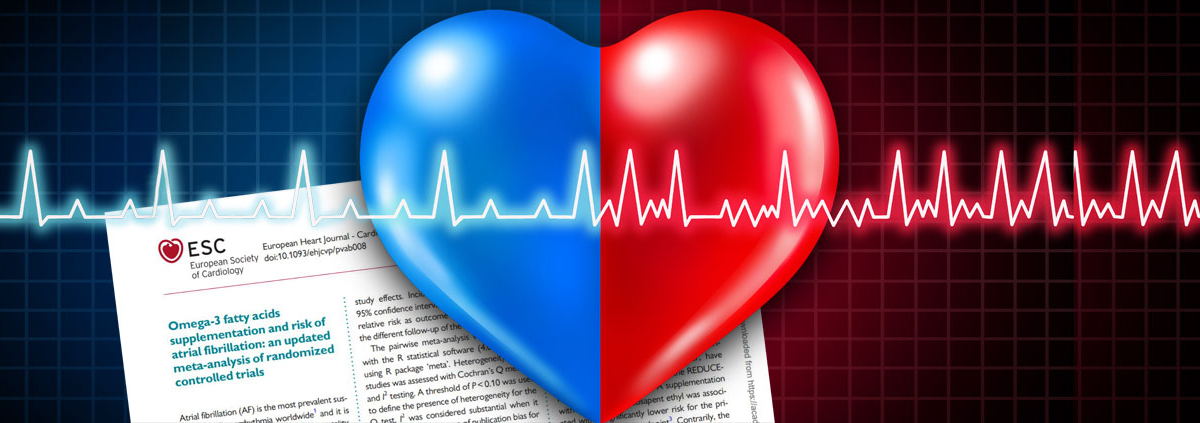Omega-3s and A-Fib: More Analysis Required
I hope that you took the time to review the paper on atrial fibrillation as well as the research letter on omega-3s and atrial fibrillation. If you haven’t, especially the primer on A-fib, please do it. It’s a serious condition that requires attention if you have it; in most cases, fixing it is surprisingly simple.
The research letter included five studies. I decided to look at each of those research papers individually to see how each trial was conducted, especially on the populations used in those experiments. Here’s what I found.
The Subjects
The subjects in the studies had several characteristics in common. First, they were, on average, in their mid 60s and older. Second, they had already had a myocardial infarction (heart attack) or were at high risk for cardiovascular disease due to factors such as obesity, hypertension, elevated triglycerides, and others. Third, most were taking multiple medications.
They definitely were not healthy and free of disease. The potential for a cardiac event increases if you’ve already had a cardiac event. On top of that, in the trials that used prescription fish oils, the attempt was to lower triglycerides in those patients who were taking a maximal dose of statins. There may be some interaction that hasn’t been identified yet between very high doses of omega-3s, equal to or greater than four grams, and statin medications or other pharmaceuticals the patients were taking to control blood pressure, heart rate, etc.
In short, this does not apply to everyone. In fact, in the concluding statement of the research letter, the researchers state that physicians should be cautious when prescribing high-dose omega-3s in patients with high triglycerides and an increased risk of cardiovascular disease.
Additional Analyses
As I alluded to in the prior paragraphs, I think the analysis should include factors such as exercise, diet, and especially prescription medications. It may be that the number of subjects might not be able to be broken down by statin intake, beta blocker intake, or ace inhibitors, but I think that it should at least be examined to see if there’s any trend.
Also, the data could be separated into those people who’ve had a heart attack and those that haven’t, even though they may have significant risk factors for cardiovascular disease. After a heart attack, there may be morphological changes such as damage to nerve conduction or the buildup of scar tissue that could impact how omega-3s impact the heart itself.
Are all of these possible? I would think it would be with over 150,000 subjects from all the studies included in the meta-analysis.
Two More Things
I still have not found a single nutritionist involved in any of this research. When you look at prior studies that seemed to benefit heart rhythms, it’s DHA omega-3, not EPA, which is the factor related to better heart rhythms.
Take a look at the map that’s in the primer on atrial fibrillation. It applies to those on Medicare who are 65 and older, but there’s an amazing and obvious trend. I’m even going to give it a name; I’ll tell you that next Tuesday. The only clue that I’ll give you is to think maps and what they’re typically used for.
The Bottom Line
While interesting, the Research Letter on the update of omega-3s in relation to atrial fibrillation leaves more questions than answers. So far, it applies only to people over 65 with high triglycerides and other risk factors for cardiovascular disease. If you already take omega-3 fatty acids, there’s probably no reason to stop, but it’s a discussion you should have with your physician.
It’s also obvious that if you do have high triglycerides, you can work on changing that by changing your diet first. Reducing refined carbohydrates is the key; eating more vegetables helps as well.
It always comes back to this: eat better. Eat less. Move more.
What are you prepared to do today?
Dr. Chet
References:
1. European Heart Journal – CVD Pharm. 2021 doi:10.1093/ehjcvp/pvab008
2. Curr Atheroscler Rep. 2020. https://doi.org/10.1007/s11883-020-00865-5
3. Atrial Fibrillation Primer. https://www.cdc.gov/heartdisease/atrial_fibrillation.htm









